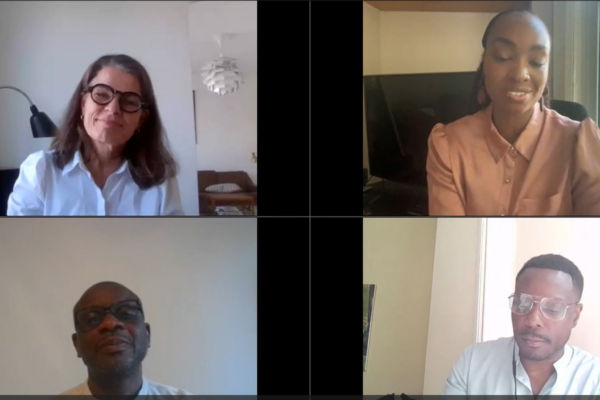We’re proud to have recently been joined by three industry experts for an insightful discussion around Diversity, Equity and Inclusion (DEI) within business, and the challenges of gathering data and setting KPIs to monitor success.
Our Saas Lead, Gary Brown hosted the discussion amongst our panellists;
Pernille Hagild, Global ED&I Leader at the Ingka Group, IKEA
Serena Lloyd-Smith, formerly Head of Diversity & Inclusion at Global
Akin Thomas, Founder and CEO of AKD Solutions – an international Organisational Change consultancy
DEI is an increasingly important function within business, with DEI strategy fast becoming a key area of focus for successful companies. Not only important for humanistic reasons, but it has also been proven that achieving a diverse, equitable and inclusive workplace results in increased innovation, creativity, and overall company profitability.
During the webinar, we delve deeper into the importance of DEI consideration in business, as well as where to start with successfully and impactfully introducing strategy and KPIs.
Gary begins by posing a question to Pernille. “What role does DEI play in delivering on your organisation’s culture and wellbeing objectives?”
Pernille discusses how diversity, equity and inclusion are really embedded into IKEA’s journey, and it starts with the company values. Being an 80-year-old company, IKEA and the wider Ingka Group have always held the same values, one of which is ‘togetherness’. Pernille expresses that “to truly live this value, we must be equal, diverse and inclusive for the many people”. She notes the importance of reaching a diverse range of people to expand the customer base.
Diversity, equity, and inclusion has been a focus for IKEA for more than 20 years, beginning with gender balance within management positions. There has since been a strong focus on race, nationality, religion, and LGBT. Pernille discusses the importance of supporting employees to be themselves. When an individual is allowed the environment to truly be themselves then “you have wellbeing, then you thrive and then you contribute”, explains Pernille. She continues to speak about IKEA and Ingka Group, saying “we are considered to have a safe microenvironment, in countries where EDI has a more difficult journey and agenda”.
She concludes, “the more diverse we are as co-workers, the more we thrive, the better we will meet the customers and live up to their needs and dreams”.
Our next panellist, Serena Lloyd-Smith, draws on her experience at the BBC to delve into the innovative way that they use DEI data to make informed, evidence-based decisions. She goes on to discuss the significance that good DEI data and strategy have to business, and the importance of moving from a “nice-to-have”, to a “must have” attitude. She explains that organisations must “specifically have a role that challenges proven systematic imbalance”.
One word of significance in the DEI environment that Serena draws focus to is “accountability”. She explains the importance of “not simply setting broad targets, but actually being accountable for making change”. Without this accountability, Serena discusses, goals and targets can very often fall by the wayside. True accountability deriving from leadership is imperative. She discusses the significance of senior leadership buy-in, with accountability following through the organisation, with suggestions of KPI-linked bonuses.
Our third panellist, Akin Thomas discusses DEI trends within business. He highlights how new the field is to many organisations, with attention drawn to the job roles being “a blank canvas”. He says that he’s starting to gradually whiteness more engagement of leadership teams and more proactiveness generally and explains that many companies have been declaring themselves as equal opportunities employers, however “80 percent of my conversations begin with ‘we’re at the beginning of our journey’.”
He continues onwards to highlight the significance of race as a focal area with the DEI space currently. He says, “race has been pushed to the forefront in a sustained way. The nervousness that we experience around ‘what can we say, how do we approach this, what do we do’, is really quite profound. And I think it’s more profound than some of the other protected characterises”.
Later in the webinar, we hear Akin address the key challenges of setting DEI KPIs. He explains that there is often a real energy to create strategies and KPIs, with no compelling vision behind them. He feels that DEI KPIs are often “seen as a punitive issue, and therefore there’s a reluctance”, and no collective desire to achieve them.
He summarises, “a lot of organisations want to write a strategy, but they’re not keen to have conversations. Until you have really powerful stimulating conversations within an organisation, nothing really changes”.
During the webinar, the panel discuss the importance of data, and how it is being used to help drive discussions and evidence-base decision making in organisations.
Serena highlights that “you can’t manage what you can’t measure”, and “your data will tell you the story that often you cannot see”. She explains how she has utilised people data through bi-annual check ins looking at the people groups within seniority and management levels, joiners and leavers, training and promotional data, succession planning, and other more niche areas appropriate to the organisation. She advises working with the managers of individual functions taking them along the journey, letting them know how their division is made up. This way they will have more invested interest in making improvements.
Akin explains that before embarking on the creation of DEI strategy and KPIs, “there needs to be a pause”, followed by three main areas of focus, which Akin summarises as “data, listen and reimagine”. Good data is an imperative foundation, which should be utilised to spark transformative conversations with people within and outside of the organisation. Finally reimagining the culture as if it were truly diverse.
Pernille discusses Ingka Group and IKEA’s challenge with DEI data globally, as each country has different policies and practices around DEI data gathering and processing. She highlights the importance of bespoke conversations and approaches within those countries, and discussions around ways and means to obtain the knowledge and information they need. For example, Pernille shares how they created a survey for coworkers to voluntarily and anonymously self-identify, to provide data that they may not have had access to. Different countries will need different approaches depending on what is relevant to their country and how their demographic is made up, and specific targets will need to be set for each.
Gary invites the three panellists to share their closing remarks.
“It begins and ends with leadership”, states Akin, “It’s about the bravery, the curiosity and the honesty or leadership”.
Serena sums up with the word “investment”, explaining that “if anything is ever taken seriously it’s about the investment that’s put in, whether its investment of people, whether it’s the financial investment.”
Pernille reminds us that “DEI needs to be integrated into the business strategies. It cannot be a standalone. It hast to be a requirement to do business. Our most important job is to make our managers aware of this”. She finishes by posing the poignant question, “what happens if we don’t do diversity and inclusion? What happens?”
To watch the full recording of our webinar, click here.
To speak to us about how you can track and measure your DEI data then please contact us.




